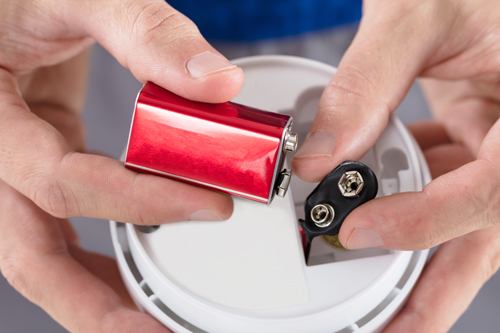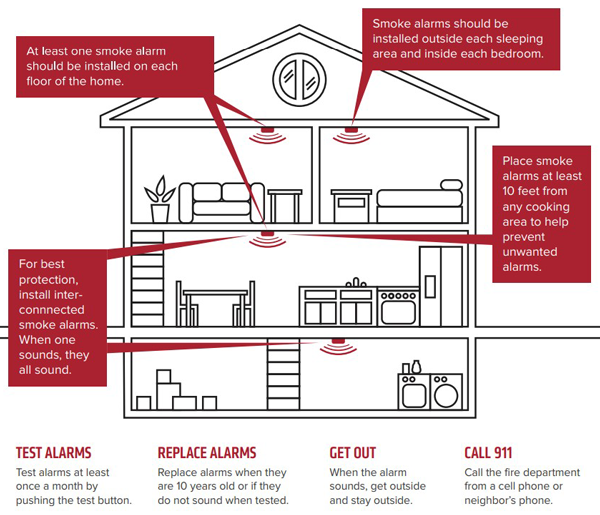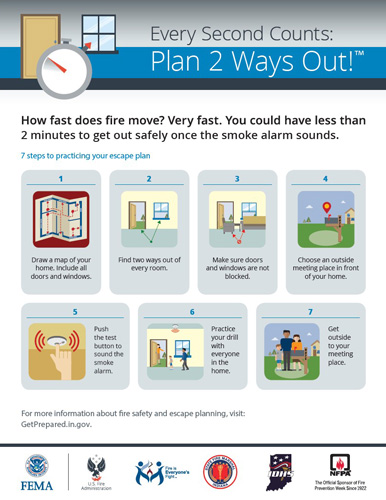Fire Prevention Week
- Get Prepared
- Fire Safety
- Current: Fire Prevention Week
Fire Prevention Week 2025 is October 5-11
Fire Prevention Week is recognized nationally during the week of October 9 every year to help people of all ages learn how to stay safe from fire. Take time during this week to learn or remind yourself of ways to prevent fires and what to do if there is one.
One of the most important ways to protect yourself from fires: smoke alarms. But what good is a smoke alarm if it is broken or the batteries are dead? When working smoke alarms are present in your home, the risk of dying in a home fire drops by 60% (NFPA). This bore true in Indiana during 2022-2023: The rate of deaths in residential fires was less than half (45%) when a smoke alarm was present, compared to residential fires where there was no smoke alarm.
Quick Tips
- Consider buying a combined smoke and carbon monoxide alarm.
- Install more than one smoke alarm. You need several throughout your residence, not just near the kitchen.
- Test your smoke alarms every month.
- Replace smoke alarms every 8-10 years.
- Have a home fire escape plan, and practice it twice a year.
Take a look at the information and resources below for more tips.
What kinds of alarms are in your home?
Most households have at least one smoke alarm, according to a 2019-2024 national survey. But only about half have carbon monoxide alarms, which detect the odorless and colorless gas that can be fatal if you inhale too much of it.
Smoke alarms also come in different types: ionization and photoelectric smoke alarms. Each type is better at detecting different kinds of potentially fatal fires. The U.S. Fire Administration recommends every household be equipped with both kinds of alarms, or dual-sensor alarms.
Remember
Consider buying combined smoke and carbon monoxide alarms, especially if your home uses gas appliances. Their ability to save your life is worth the cost of these alarms! But if cost is an issue, some fire departments offer reduced-price, or even free, smoke alarms. Contact your local fire department's non-emergency phone number for more information.
Where are your alarms?
Many people know to put smoke alarms near the kitchen because of cooking fires. In fact, cooking fires are the leading cause of residential fires in Indiana, with a total of 253 cooking fires in 2023 and 315 in 2022, so be sure to install a smoke alarm where you cook.
Smoke alarms should be located no closer than 10 feet from a stove to prevent unnecessary triggers. Similarly, carbon monoxide alarms should be placed near, but not immediately next to, fuel-burning appliances like furnaces.
Additional smoke alarms should be installed on every level of your residence, inside every bedroom and outside each sleeping area.
Remember
Fires can happen at any time of day, and overnight fires account for most fire deaths in the home. Install smoke alarms inside every bedroom so you can be alerted to a fire when you are sleeping.


Do you really know if your smoke alarms are working?
A 2019-2024 national survey indicated that almost all households have a smoke alarm (99%). But about one in five people (16%) thought their alarms worked but were wrong when the alarms were tested.
Remember
If your smoke alarm has an issue, such as no power source, then you are not protected. It cannot warn you about a fire, and more than two-thirds of residential fire deaths occur when there is not a working smoke alarm in the home. Test your smoke alarms every month.
Do you really know how old your smoke alarms are?
Only half (51%) of households nationwide were correct about the age of their alarms when they were tested (U.S. Consumer Product Safety Commission).
Remember
You need to replace your smoke alarms every 8-10 years and your carbon monoxide alarms every 5-7 years. Check the alarm's age every month when testing it.
What do you do when there is a fire?
A residential fire can become life-threatening in less than two minutes, making every second valuable. When your smoke alarm sounds, take it seriously. In some cases you might be able to put out a small fire using a home fire extinguisher, but for larger fires, you need to escape quickly. When escaping your home, stay low to the floor to avoid heat and smoke and so you can see better. Once outside, stay outside and call 911.
Remember
Do not spend time trying to save personal property when there is a fire. Smoke inhalation can be fatal, so quickly escaping to clean air is very important to survival. Help others with limited mobility to evacuate, but get low and go!
Do you have an escape plan?
Every second is valuable when escaping a residential fire. Knowing how to get out quickly can mean the difference between life and death.
Identify two ways out of every room in your home, write the plan down (draw a map) and make sure all doors and windows can open easily. Also choose a meeting place that is a safe distance away from the home.
Remember
If you do not practice your escape plan, you may run into unexpected issues when there is a real fire. Practice your escape plan every six months with everyone in your household.
Use these resources to learn more and share with others.
-
Get Alarmed
The IDHS Get Alarmed campaign has been working closely with fire departments since 2019 to distribute smoke alarms across the state at no cost, thanks to a federal grant. Individuals who want smoke alarms can request them through their local fire department.
Get Alarmed


